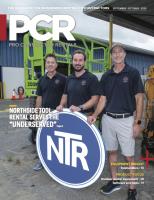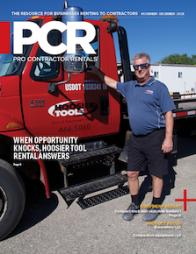Business Management -- Selling used equipment
There are many digital marketing strategies heavy equipment companies can use, but choosing the best ones can be challenging.
by Bill Clark
So how can you be sure that your strategy is targeted enough to reach the right potential businesses, but not so targeted that it alienates part of your demographic? The following marketing ideas for heavy equipment and machinery should help get you pointed in the right direction.
Have a robust, responsive website
Your website is likely to be the first place potential buyers who are investigating your equipment go to find information about your offerings. In order to provide everything they are looking for and to improve the chances that they make a step to contact you or make a purchase, your website should be robust, responsive and thorough.
It should be optimized for search engines to make it as easy as possible for potential customers to find. Some of the elements your website should contain include:
Clear navigation. You should have a strong homepage that gives viewers a complete understanding of what you offer as well as clear links to more specific pages. Most people skim through copy on web pages, so add bullets and call-out boxes for clarity and ease.
Keep your navigation as simple as possible, and use responsive design, which adapts the web site to best match the device on which it is being viewed, helps ensure that it is accessible on all devices.
Post comprehensive product listings. If a business is looking into buying a piece of heavy equipment, it’s critical that they know the specs of the equipment you offer. Although it may be easier to list broad product categories and hope that people will contact you for more information, it’s better to include every product you offer on your site. Make sure to add any additional items that can be purchased to modify the equipment for the needed purposes.
Use photos. Images speak much louder than words and can add a great deal of visual clarity to text. Invest some money in high-quality, professional photos and include them on your site. Be sure to include descriptive alt tags to let site visitors know what the images are in case they can’t be displayed.
Include purchasing information. Make it 100 percent clear how your sales process works. Do you accept orders online? Do you offer sales in addition to rentals? Do you work with businesses directly? The more straightforward your purchasing information is, the more like it is that site visitors will make the effort to take the next step.
Run pay-per-click (PPC) campaigns
You may also consider running PPC campaigns to attract qualified traffic to your site. Heavy machinery is a competitive industry, and whether you’re a manufacturer or distributor, you know that reaching new customers can be a challenge.
PPC advertising allows you to reach your most qualified prospects where they’re already searching online. And one of the major benefits of PPC is that you don’t have to wait for results. If you’re looking to quickly increase traffic to your website and increase revenue, PPC is a great option.
Build/maintain your social media profiles
If you think that social media is only for B2C companies, you’re mistaken. In today’s world, maintain a presence on top social media sites, like Facebook, Twitter, and LinkedIn can help your business connect with potential customers.
Post on your social media pages regularly. You can do this by linking to your products, adding testimonials, share the history of your company or by simply sharing articles from other sites that your target audience might find interesting. If you don’t have time to update your social media pages yourself, delegate the project to someone you trust within your company.
Start a YouTube channel
If you’re planning to add any videos to your website (which you should), it’s wise to create a YouTube channel. A channel is the perfect platform for you to clearly illustrate what your equipment’s capabilities and can be much more interesting than images.
You can show videos of your equipment in action, post video testimonials from happy customers and share basically any other kind of content in video format. This allows you to address important aspects of your equipment as well as educate consumers. YouTube is a convenient platform for hosting the videos you want to share on your site and social media accounts.
Write for relevant publications
Every industry has unique professional publications and many people see them as a go-to resource for staying up to date with industry news and trends. Try to build connections with these publications and reach out to the editorial staff and see if they are looking for guest articles or columns.
You may be surprised to learn that they are open to this kind of arrangement. Usually, you cannot talk about your product as being better than another, but you’ll at least get your name and company some visibility. Plus, if the publication is online, it can be a great way to build high-authority links to your site.
Offer your expertise
If your company is well-known enough, you may be seen as an expert in your field. If this is the case, be sure to make it clear that you are open to interviews.
Writers for industry publications may want to speak with you about your company or the field in general. If so, be willing to offer your expertise. No one wants to read an unhelpful or generic article, so you have to be prepared to share useful, insightful information.
Attend conferences and conventions
Do you attend the major conferences and conventions in your industry? Certainly, this costs money, which is why some heavy equipment manufacturers are hesitant to do it. However, it’s definitely worth setting aside some of your marketing budget.
These events are a fantastic way to build connections with buyers and dealers, and they can also be a great source of content for your site and social accounts.
Use email to stay in touch
The heavy equipment industry has a long sales cycle, and it’s important to stay in contact with each of your leads as they make their decisions. Email marketing campaigns are a great way to do this.
You can use newsletters, drip campaigns, and lead-nurturing emails to make sure that your leads don’t forget about your business and see your brand as a helpful source of information.
Bill Craig is president of WebFX, a company that has helped several B2s cleints improve their online presence. www.webfx.com








